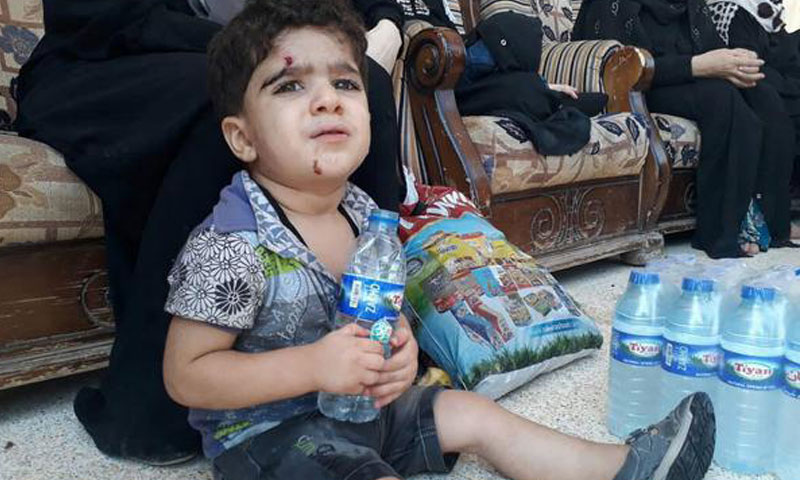There is nothing new about people’s daily life of Raqqa and Deir ez-Zor provinces, except for the increasing number of victims and the amount of destruction and displacement, as fighting continues in the region while other fights are being prepared for soon. “This shame,” as described by the activists of the two provinces, comes within the framework of international and regional interests, which are based on fighting ISIS, while ignoring the fate of thousands of civilians.
Images of destruction and death coming from the two regions did not succeed to deliver the voice of the people and halt the fighting. The noise of the weapons continued to rise above the cries of civilians, amid the difficulties that stand in the way of providing shelter and safe passage for them, far away from the front lines. Some have said to Enab Baladi that “liberation is not to be achieved through destroying cities, killing civilians’ children or displacing them and then replacing them by a tyrant.”
Huge Tax
Hassan al-Mohammed, a 23-year-old young man from Raqqa, stated that the tax of the city’s “liberation” from ISIS may be “huge”, but he stressed that the casualty figures there are “shocking and indicative of what is happening as civilians massacre rather than a break-into the city.”
“We have been trying our best to find a party ready to listen to our concerns through different ways,” said Hassan to Enab Baladi, referring to the launching of dozens of campaigns to open secure corridors that would enable civilians to cross to safety. This suggestion was met with the United Nations apprehension. Jan Egeland, the UN’s Humanitarian Affairs coordinator, who asked for cease-fire in order to allow the exit of civilians, described Raqqa as “the worst place on earth.”
According to the estimations of the province activists , the neighbourhoods that are still under ISIS control include more than 20 thousand civilians, spread over five neighbourhoods in the city, besieged from the four sides.
In his speech, Hassan spoke about Deir ez-Zor, and confirmed that it is in no better conditions than Raqqa, amid the ongoing displacement towards the desert as well as the international coalition’s continuous targeting of ISIS in the province.
Few Options
“The people of this land cannot find peace and tranquillity wherever they go,” said Abu Hafs, who lives in the countryside of Deir ez-Zor and prefers to die “decently in his own land” according to him.
The civilians have few options, according to the young man who considered that escape and displacement do not represent a real solution as “the hardships of the people do not depend on ISIS-held areas, but they trespass it to reach the scattered camps inhabited by thousands without any attention and care.”
Fears of the future and of the unknown fate are the two common features that bring together the cities of eastern Syria, according to Rania Abdullah, aged 26, who fled from Raqqa and resorted to Turkish Urfa three years ago.
In an interview with Enab Baladi, the young woman said “all that we feel here is our inability to help our people at home. No one listens to our problems. We die but no one cares about us.” She described what happens as “integrated crimes through which international law has collapsed, and Humanity becomes naked of all bare slogans, held on top of the United Nations building.”
Most of the people Enab Baladi spoke to agreed on the fact that Raqqa and Deir ez-Zor are the names of two doomed cities. Rania does not care about what is being broadcasted on media outlets as “death and bombardment surround our shattered lives, while our data and messages go unheard. Our screaming continues to echo in an empty desert.”
Human Rights Report documenting Torture and Executions carried out by QSD
The Syrian Human Rights Network documented torture and executions and attributed it to the “Syrian Democratic Forces” (QSD), revealed a report Enab Baladi obtained a copy of on Friday 25 August. QSD methods of torture and the toll of its victims have risen since the beginning of 2016, some of which have been “blamed on race” in addition to the international coalition’s continuous violations against civilians.
QSD denied its involvement in any torture accident attributed to her and stated that it is “working to liberate civilians from ISIS injustice.” However, the accusations resurfaced after leaks and videotapes were broadcasted by media at the end of last July.
On 30 June, Anadolu Agency published a video recording showing two armed members from QSD, kicking handcuffed detainees in al-Mansoura in western Raqqa.
On July 15, a videotape showed armed members firing directly at a man with hands tied and two corpses lying next to him. One of the armed men said “this is the fate of everyone who fights the YPG (Kurdish Democratic Union) and the fate of everyone who belongs to ISIS.”
The report tackled the incident of the murder of the 80 -year-old man Ahmed Zino on July 21, pointing out that the network got pictures of his corpse showing a shot on his right shoulder. Previously, the old man’s name was included in the recorded list of victims on June 24, after his home in Rumaila neighbourhood was bombed.
The network stated that the “Syrian Democratic Forces” (QSD) record is full of abuses, extrajudicial murders, indiscriminate random attacks and arbitrary arrests of civilians.
The indiscriminate bombardment of the Coalition and QSD caused tens of thousands of people to flee, most of whom were forced to remain in desert areas unsuitable for displacement, while the network estimated that 120 thousand people were displaced from the city.











